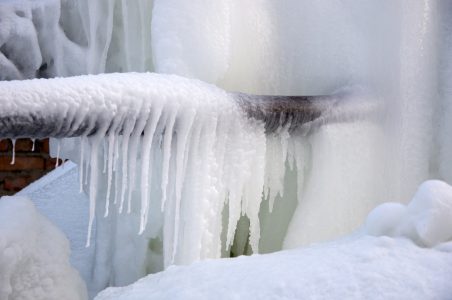Shielding Your Pipes from Cold Weather Damage: Critical Approaches
Shielding Your Pipes from Cold Weather Damage: Critical Approaches
Blog Article
Have you been in search of resources on Prevent Frozen Pipes ?

Cold weather can ruin your pipes, specifically by freezing pipelines. Right here's how to stop it from taking place and what to do if it does.
Intro
As temperature levels decrease, the threat of icy pipelines increases, potentially bring about costly repairs and water damage. Comprehending exactly how to prevent icy pipes is essential for homeowners in chilly climates.
Recognizing Frozen Pipelines
What causes pipelines to ice up?
Pipes ice up when exposed to temperature levels below 32 ° F (0 ° C) for prolonged durations. As water inside the pipes freezes, it increases, putting pressure on the pipe wall surfaces and possibly causing them to rupture.
Dangers and problems
Icy pipes can result in water disturbances, home damages, and pricey fixings. Ruptured pipelines can flooding homes and create extensive structural damages.
Indicators of Frozen Pipeline
Determining frozen pipes early can prevent them from bursting.
How to identify icy pipelines
Seek lowered water circulation from faucets, unusual smells or sounds from pipelines, and visible frost on exposed pipelines.
Avoidance Tips
Protecting vulnerable pipelines
Cover pipes in insulation sleeves or use warmth tape to secure them from freezing temperatures. Concentrate on pipes in unheated or outside locations of the home.
Home heating techniques
Keep interior rooms sufficiently heated, specifically locations with plumbing. Open up cupboard doors to permit warm air to distribute around pipelines under sinks.
Protecting Outside Pipes
Yard hoses and outside faucets
Separate and drain pipes yard hoses before winter season. Set up frost-proof faucets or cover exterior taps with shielded caps.
What to Do If Your Pipelines Freeze
Immediate activities to take
If you believe icy pipelines, maintain taps open up to soothe stress as the ice thaws. Utilize a hairdryer or towels soaked in hot water to thaw pipes gradually.
Long-Term Solutions
Architectural modifications
Take into consideration rerouting pipes far from outside walls or unheated areas. Include added insulation to attic rooms, cellars, and crawl spaces.
Updating insulation
Purchase premium insulation for pipes, attics, and walls. Correct insulation aids preserve constant temperatures and reduces the risk of icy pipes.
Conclusion
Preventing icy pipes requires aggressive steps and quick feedbacks. By comprehending the causes, indications, and preventive measures, home owners can secure their plumbing throughout cold weather.
Helpful Tips to Prevent Frozen Pipes this Winter
UNDERSTANDING THE BASICS: WHY PIPES FREEZE AND WHY IT’S A PROBLEM
Water freezing inside pipes is common during the winter months, but understanding why pipes freeze, and the potential problems it can cause is crucial in preventing such incidents. This section will delve into the basics of why pipes freeze and the associated problems that may arise.
THE SCIENCE BEHIND FROZEN PIPES
When water reaches freezing temperatures, it undergoes a physical transformation and solidifies into ice. This expansion of water as it freezes is the primary reason pipes can burst. As the water inside the pipe freezes, it expands, creating immense pressure on the walls. If the pressure becomes too great, the pipe can crack or rupture, leading to leaks and water damage.
FACTORS THAT CONTRIBUTE TO PIPE FREEZING
Low Temperatures: Extremely cold weather, especially below freezing, increases the risk of pipes freezing. Uninsulated or Poorly Insulated Pipes: Pipes located in unheated areas, such as basements, crawl spaces, or attics, are more prone to freezing. Insufficient insulation or lack of insulation altogether exacerbates the problem. Exterior Wall Exposure: Pipes running along exterior walls are susceptible to freezing as they encounter colder temperatures outside. Lack of Heating or Temperature Regulation: Inadequate heating or inconsistent temperature control in your home can contribute to frozen pipes. PROBLEMS CAUSED BY FROZEN PIPES
- Pipe Bursting: As mentioned earlier, the expansion of water as it freezes can cause pipes to burst, resulting in significant water damage.
- Water Damage: When pipes burst, it can lead to flooding and water damage to your property, including walls, ceilings, flooring, and personal belongings.
- Structural Damage: Prolonged exposure to water from burst pipes can compromise the structural integrity of your home, leading to costly repairs.
- Mold and Mildew Growth: Excess moisture from water damage can create a favorable environment for mold and mildew growth, posing health risks to occupants.
- Disrupted Water Supply: Frozen pipes can also result in a complete or partial loss of water supply until the issue is resolved.
WHY CERTAIN PIPES ARE MORE PRONE TO FREEZING
- Location: Pipes located in unheated or poorly insulated areas, such as basements, crawl spaces, attics, or exterior walls, are at higher risk of freezing.
- Exterior Pipes: Outdoor pipes, such as those used for irrigation or exposed plumbing, are particularly vulnerable to freezing as they are directly exposed to the elements.
- Supply Lines: Pipes that carry water from the main water supply into your home, including the main water line, are critical to protect as freezing in these lines can affect your entire plumbing system.
- Underground Pipes: Pipes buried underground, such as those connected to sprinkler systems or outdoor faucets, can be susceptible to freezing if not properly insulated.
https://busybusy.com/blog/helpful-tips-to-prevent-frozen-pipes-this-winter/

Do you really like more info about Prevent Frozen Pipes ? Post a remark further down. We will be pleased to listen to your responses about this content. Hoping that you visit us again in the near future. You should take a moment to promote this content if you appreciated it. I am grateful for being here. Don't forget to pay a visit to our blog back soon.
Or Book Technician Here Report this page